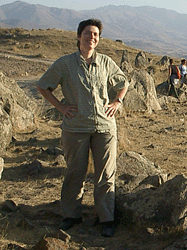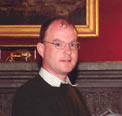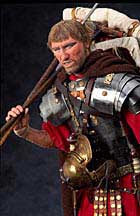
"John R. Hale is the Director of Liberal Studies at the University of Louisville in Kentucky. He earned his B.A. at Yale University and his Ph.D. at Cambridge University in England. Dr. Hale teaches introductory courses on archaeology, as well as more specialized courses on the Bronze Age, the ancient Greeks, the Roman world, Celtic cultures, Vikings, and on nautical and underwater archaeology.
Dr. Hale's writing has been published in the journal Antiquity, The Classical Bulletin, the Journal of Roman Archaeology, and Scientific American. He is also the author of Lords of the Sea, a book about the ancient Athenian navy. Dr. Hale has received many awards for distinguished teaching, including the Panhellenic Teacher of the Year Award and the Delphi Center Award.
An accomplished instructor, Dr. Hale is also an archaeologist with more than 30 years of fieldwork experience. He has excavated at a Romano-British town in Lincolnshire, England, and at the Roman Villa of Torre de Palma in Portugal. He has also carried out interdisciplinary studies of ancient oracle sites in Greece and Turkey, including the famous Delphic Oracle, and participated in an undersea search in Greek waters for lost fleets from the time of the Persian Wars." - The Teaching Company
Education
B.A, Yale University, 1973
Honors: Lang Award for Classical Archaeology
Ph.D. in Archaeology, Cambridge University, 1979
Dissertation: Bronze Age Boats of Scandinavia
Recent publications:
A Report on the tombs and human skeletal remains at the Paleo-Christian basilica of Torre de Palma," Reunio d'Arqueologia Christiana Hispanica, IV, Barcelona, 1995.
"The lost technology of Ancient Greek rowing," Scientific American, May, 1996.
"The villa of Torre de Palma," Journal of Roman Archaeology, Vol. 9, 1996.
"Phormio Crosses the T," The Quarterly Journal of Military History, Vol. 8, 1996
"General Phormio's Art of War," Polis and Polemos: Essays on Politics, War, and History in Ancient Greece in Honor of Donald Kagan, California, 1997.
"The Viking Longship," Scientific American, February 1998.
"The Geological Origins of the Oracle at Delphi, Greece," (with Jelle de Boer) in The Archaeology of Geological Catastrophes, W.J. McGuive et al., eds., London 2000
Field Work
Fieldworker at Yale University survey of the Eli Whitney historical site, New Haven, Connecticut, 1972.
Field archaeologist at the University of Nottingham excavations at Dragonby, a Roman-British site in Lincolshire, 1972.
Survey of Bronze Age rock art in Southern Norway and Southwest Sweden, 1977.
Field director for Phase II survey of Riverfront Industrial Park, Jefferson County, Kentucky, 1980.
Field director for Phase I and II investigations of Otter Creek Park, Meade County, Kentucky, 1980-1981.
Field Director for University of Louisville's excavations at Roman Villa of Torre de Palma, 1984-present.
Archaeologist for interdisciplinary study of Geology and Monuments at Delphi, Greece, 1996-present.
Contact information:
hale@louisville.edu

















